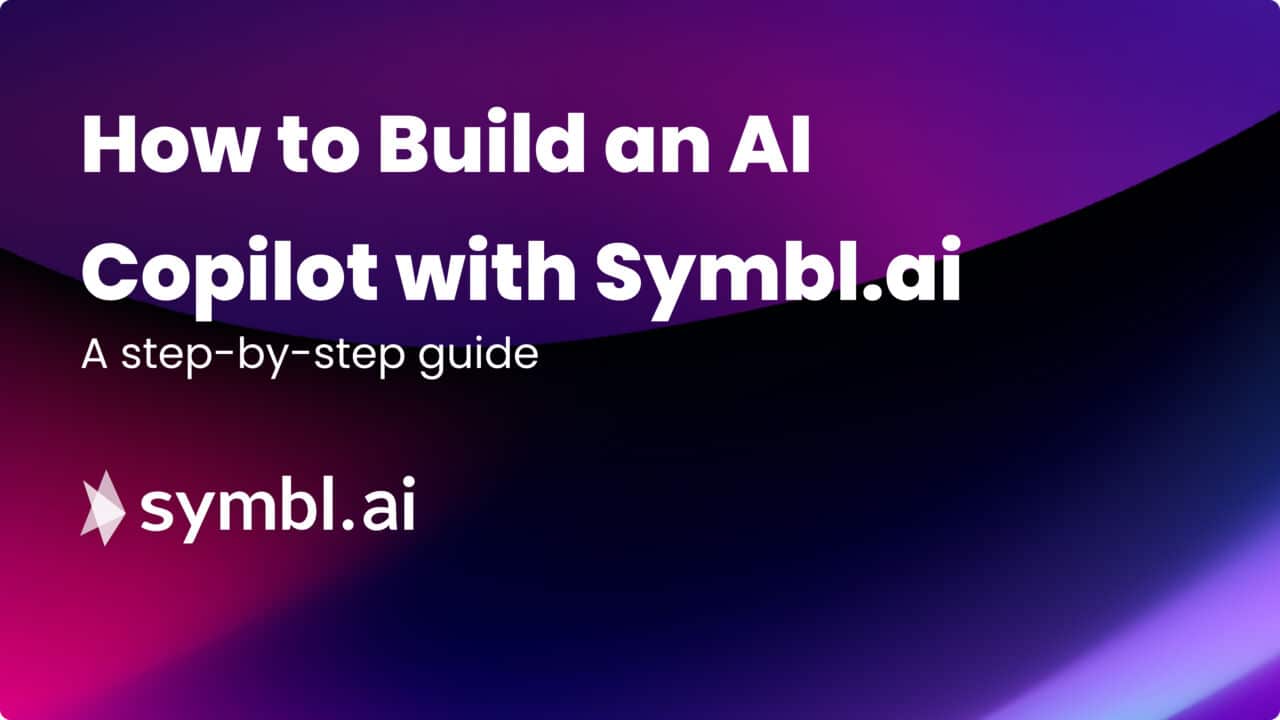AI Copilots have revolutionized the way we work. They have become indispensable everyday companions for enhancing productivity, creativity, and skill sets across various domains. In this blog, we’ll cover how you can create your own AI Copilot using Symbl.ai’s Nebula LLM, Nebula Embeddings, and other platform capabilities such as ASR and Trackers.
To illustrate the process, we will focus on creating an AI Sales Copilot that is adapted to your domain and business needs. The AI Sales Copilot will automatically generate meeting notes, enrich CRM data on the go, evaluate sales reps’ performance, answer sales queries, and assist the sales team in real time during prospect calls.
Generate Meeting Notes
In the fast-paced world of sales, taking comprehensive meeting notes during client interactions can be a distracting chore. Moreover, the post-meeting process of converting scribbled notes into a format suitable for CRM entry compounds the workload.
Having an AI Sales Copilot to automatically generate meeting notes addresses the above challenge. You have two methods to achieve this with Symbl.ai:
- Out of the box: As a swift and efficient solution, you can employ Symbl.ai’s prebuilt Insights UI, allowing you to generate meeting notes for your audio and video calls with minimal API calls. Powered by Symbl.ai’s Nebula LLM, Insights UI provides an intuitive interface replete with key details such as meeting summaries, action items, Q&A, objections, and sentiment analysis. Learn more from our previous blog that goes into details of Insights UI.
- Customization: For those who prefer a tailored approach, Nebula LLM offers flexibility. Using Nebula, just with a few prompts, you can craft meeting notes that precisely match your preferred format and style, ensuring that your notes align seamlessly with your sales process and workflows.
Enrich CRM data
Maintaining an accurate and up-to-date Sales CRM system is paramount for successful sales teams. Sales representatives are often burdened with the time-consuming task of manually updating and managing customer data resulting in incomplete and inaccurate CRM data.
Bring in your own AI Sales Copilot to automate CRM enrichment, effectively extracting vital information from sales calls about contacts within prospect companies and generate concise opportunity summaries. This automation significantly alleviates the manual effort and ensures that your CRM remains a reliable and current resource.
The following architecture diagram illustrates how you can use multiple components from Symbl.ai to automate CRM enrichment:

Evaluate Sales Performance
Evaluating the performance of sales representatives on an ongoing basis is challenging, as it involves manually tracking numerous variables, from communication skills to adherence to the sales process, which can be time-consuming and prone to biases.
Automating the evaluation process streamlines the task, saving time and providing consistent, data-driven insights, enabling quicker identification of areas for improvement and more efficient coaching.
With Symbl.ai, you have two approaches to enable the AI Sales Copilot do automatic performance evaluations:
- Out of the box: Symbl.ai’s Call Score API provides a pre-configured scoring system for assessing sales reps’ performance based on predefined criteria such as Communication & Engagement, Forward Progression, Sales Process, and Question Handling. The results are also available on the pre-built Insights UI. To learn more about Call Score API, refer to our previous blog on Call Score.
- Customization: If the criteria or the scoring methodology of Call Scoe API does not work for you, use Nebula LLM to score your sales calls as per your custom criteria and sales process. For instance, if your organization adheres to a particular sales methodology like MEDDIC, you can craft a prompt tailored to the MEDDIC framework, resulting in a call score that aligns precisely with your unique criteria.
Sales Q/A bot
Sales representatives often grapple with delays and inefficiencies when responding to prospect inquiries. Such challenges can lead to missed opportunities, reduced customer satisfaction, and diminished chances of closing deals successfully.
A Sales Q/A bot as part of your Copilot will serve as an everyday companion to answer all queries that sales representatives have on a day to day basis. To build a Q/A bot, the first step is to construct a knowledge base capable of efficiently addressing a myriad of prospect inquiries, spanning product information, customer interactions, internal meetings, and other pertinent data. Symbl.ai’s Embeddings API plays a pivotal role in converting this wealth of information into vectors, which in turn enables efficient semantic search as shown in the architecture diagram below:

Once you have your domain knowledge available in an efficient retrieval system, employ Nebula LLM to utilize the domain knowledge when answering sales representatives’ questions. This technique is popularly known as Retrieval Augmented Generation (RAG):

Real-time Assistant
Building on the knowledge base that underpins the Sales Q/A bot above, the subsequent step is to infuse real-time conversations between sales representatives and prospects with this invaluable resource.
Symbl.ai’s Trackers come into play here, capturing instances where sales representatives may require immediate assistance, such as mentions of competitors, objections, and new product questions. By querying the knowledge base in real time, the AI-driven assistant can supply instant answers, enabling sales representatives to capitalize on the crucial moment when the prospect’s attention is most engaged.
To dive deeper into how to build a real-time assistant as part of your AI Sales Copilot, refer to our detailed blog on Real Time Assist.
Conclusion
To sum it up, we’ve explored how to build an AI Sales Copilot that is tailored to suit the specific needs of your business. Each component of the Copilot can be developed independently, granting you the flexibility to begin where you find most compelling. The architectural frameworks we’ve discussed in this blog can be readily adapted to diverse use cases, spanning contact centers, support teams, and recruitment. If you’re eager to learn more about how to construct your very own AI Copilot, contact us.
